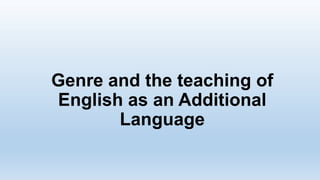
Genre and the teaching of English
- 1. Genre and the teaching of English as an Additional Language
- 2. In the South African Context • The Senior Phase EFAL CAPS states that the major learning approach is text based. • “The text-based approach explores how texts work. The purpose of the text based approach is to enable learners to become competent, confident and critical readers, writers, viewers and designers of texts. It involves listening to, reading, viewing and analysing texts to understand how they are produced and what their effects are. Through this critical interaction, learners develop the ability to evaluate texts. The text-based approach also involves producing different kinds of texts for particular purposes and audiences. This approach is informed by an understanding of how texts are constructed.”
- 3. The Genre Approach to teaching Language
- 4. Background to the Genre Approach • The Genre approach became popular in the 1980s • additional language teaching • based on the work of Michael Halliday in Australia. • text is the central teaching tool – • read, analyse and construct texts using guidelines or rules about the structure of different types of texts. • purpose of all text is communication • purpose, audience and meaning accentuated throughout the cycle of reading and writing.
- 5. What is Genre? TEXT TYPE • Every text has a specific purpose and usually a specific audience. • 3 main social purposes of texts (genres) • Engaging/entertaining • Informing • Evaluating
- 7. Stages (structure) • Each genre has a specific structure • goes through a series of steps to achieve its purpose. • Steps are more or less predictable • Stages – most predictable steps • Eg Orientation, Complication and Resolution in a narrative. • NB: Any text will have more than one purpose, but it is its main purpose that determines its stages
- 8. Some Genres used in Senior Phase
- 9. Narratives • Stories • Purpose – to entertain • Stages • orientation - who, what, where, when, etc, • complication – a problem - can get worse, partly resolved, involve some description or comment • resolution - problem is finally resolved
- 10. Exercise • Think of a well known story • Identify the 3 stages of the story Think of a story ….
- 11. Language patterns in a narrative • These include • descriptive or figurative language • direct speech • action nouns • Tense can vary
- 12. Factual Reports • Classify and describe things • Purpose - to inform • Stages • classification • description
- 14. Language Patterns in a report • These include • timeless present (facts are always the facts, and will never change) • action verbs – eat, hunt, etc
- 15. Explanations • To explain phenomena and how they work • Purpose – to inform • Stages • Classification • Explanation • Mostly found in Science and related subject books and textbooks
- 16. How does Whatsapp work? WhatsApp is a free third party application which allows you to communicate with your friends and family, share images, videos and links using network access. PHENOMENON EXPLANATION This application is internet based. The application, once installed, creates a user account in the database. Fact 1 After that it accesses the smartphones phonebook and syncs it with its Fact 2 own database making it easier for the user to connect with his/her own contacts those who have accounts on Whatsapp. Fact 3 One of the most versatile features of Whatsapp is the ability to send messages to large groups of people at once
- 17. Language patterns in explanations • These include • Timeless present • Time and sequence words – first, next, after
- 18. Procedural Texts • 3 types • Procedures • Purpose – explain or instruct how to do a task/experiment • Procedural Recounts • Purpose -explain how a task/experiment was done • Protocols • Purpose – explain what to do or not to do eg rules
- 19. • Procedure stages • Purpose • Equipment • Method • Procedural recount stages • Purpose • Method • Results
- 20. Exercise • Discuss a procedure on how to make tea • Purpose, Equipment, Method How would you tell someone how to make tea?
- 21. Language patterns in procedural texts • Procedure • Often use phrases not sentences • Present tense • Action verbs – imperatives – put, do, boil, etc • Procedural recount • Past tense • Action verbs/imperatives
- 22. Evaluating texts - Arguments • Used in academic writing • Purpose – present and support a point of view • Stages • Thesis – state the point of view • Argument – points to support the point of view • Reiteration – restate the thesis, stating how it has been proved
- 23. Language patterns in Arguments • These include • Nominalisation • Text connectives to link ideas and paragraphs
- 24. Evaluating texts - reviews • Often found in EFAL writing exercises as Book Reviews. Other personal writing such as diaries of events are also a type of review • Purpose - react to an event or text • Stages • Context • Description • Evaluation
- 25. Language patterns in reviews • These include • Use of personal pronouns (eg “I”) • Opinion